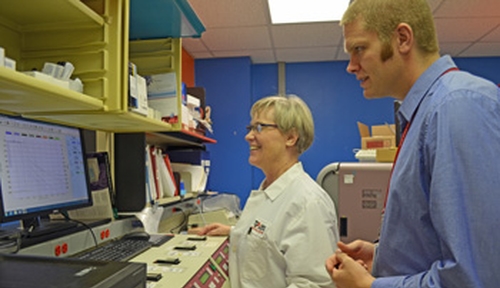In the marathon to obtain both M.D. and Ph.D. degrees, there are moments when one wonders if he or she should keep going.
“When everyone graduates from medical school and you’re sitting in a lab and your experiment failed,” said Allison Cushman- Vokoun, M.D., Ph.D., assistant professor and medical director of molecular diagnostics in the department of pathology and microbiology. “It’s not such a fun day.”
But as you can see by her title, she persevered. Those who take on the M.D./Ph.D. track tend to have that kind of drive.
UNMC’s M.D./Ph.D. Scholars Program turns out graduates who have not only the desire to help patients clinically, but also the drive and curiosity to tackle deeper questions. It’s the perfect track for becoming a physician-scientist.
UNMC is invested in turning out more physician-scientists.
“These particular scientists are key translators,” said Jennifer Larsen, M.D., vice chancellor for research. “Not only between branches of science investigation but between groups of investigators — clinical and basic science. Without investigators trained in both, our laboratory research takes a lot longer to move toward clinical application.”
The demand for these physician-scientists has prompted UNMC to expand its program from 18 students in 2007 to 32 students today.
Students have their medical school paid for by the College of Medicine and UNMC, and graduate school costs are picked up by respective departments and faculty extramural funding. The program is working toward becoming a National Institutes of Health Medical Scientist Training Program to obtain additional support. The goal is to alleviate medical school debt so graduates can have time in their careers to devote to research.
The program is a tough grind — typically two years of medical school, then, three or four years of the Ph.D. program, followed by the last two years of M.D. Then residency. Maybe a fellowship. Twelve years minimum.
But it’s been worth it, program graduates on faculty said, to have the backgrounds they have, to be able to do the kind of work they wanted to do.
“The combination of the two does give you a unique perspective,” said Dan Anderson, M.D., Ph.D., assistant professor of cardiology.
“I’ll find myself at clinical conferences, asking, ‘What could we do to understand the molecular biology of this?’ Or, we’ll be looking at the molecular biology and I’ll think, ‘Oh, that makes sense clinically.’ ”
That’s the kind of translation Dr. Larsen encourages.
And the students in the program already are thinking in terms of translation: “My hope is that I will be able to use my engineering training to solve problems I encounter in the delivery of health care while treating patients,” said Jake Riggle, who is in his sixth year of the program. “This could range from the creation of a surgical tool to the development of a training program for residents to the analysis of current medical interventions.”
“Graduates from the program have spread across the country,” said Shelley Smith, Ph.D., program director, “carrying the name of UNMC.”
To qualify for the M.D./Ph.D. program:
So, how does one get into UNMC’s M.D./Ph.D. Scholars Program?
The qualifications of scholars currently in the program are comprised of a mean MCAT score of 32 and undergraduate grade-point average of 3.71. Hopefuls must first apply to med school, filling out a primary application from the American Medical College Application Service (AMCAS). There’s a spot to indicate you also are applying to an M.D./Ph.D. program. From there, applicants will receive a secondary application from UNMC.
Those who make it past that round will come to campus for a Wednesday through- Friday process, which alternates between more informal get-togethers with current scholars and mentors, and formal interviews. In 2011, UNMC had 47 applications, and interviewed 21 candidates. The number of openings each year can vary, but there are currently 32 scholars in the program.
And yes, mid-way through med school, a promising student can decide to change course, and apply to the M.D./Ph.D. track.
For those accepted, all schooling is paid for. But program alumna Allison Cushman-Vokoun, M.D., Ph.D., said “Do it because you have the drive and initiative to attack problems from both the clinical and scientific perspectives, not for the money.”
After all, if you started earning a salary instead, for the number of years it takes to earn a second degree, “in the long run,” she said, “it probably all evens out.”
